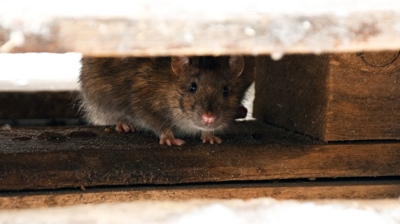
The Most Effective Rodent Control Solution For Plymouth Properties
When you were in school, you undoubtedly had moments when you stared at a math problem trying to figure out the correct solution to the problem. As you looked at the paper, your mind scrambled to find the avenue to solve the equation. Finding a solution is not easy; sometimes, you need a tutor or additional help to get you moving in the right direction.
When rodents enter your house, you need to find a solution. Hearing them scratch inside the walls or underneath the floor while you lay in bed at night is disconcerting. Watching a mouse scurry from beneath a piece of furniture is frightening, and finding droppings in the pantry is sickening.
As most of us learned from our school day, finding a solution yourself is not always possible; occasionally, you need help from others. Although many think the answer to their rodent problem is a few traps, they soon discover that no matter how many snares they install, they continue to have rodents running through the house.
Instead of wearing yourself out battling rodents, you need pest control in Plymouth from Combat Pest Control. For the last 25 years, our locally owned and operated company has removed pests from local homes. As National Pest Control Association members, we take our mandate to provide high-quality pest control seriously. We train our technicians to use the latest, environmentally safe products.
You probably found this article because you are looking for a solution to your rodent problem, and we want to help you. Part of finding an answer to your rodent issue involves learning about the enemy and how to keep them out of your house. So, please keep reading to learn what you need to know to combat rodents in your home.

Why Combat Pest Control Is The Right Choice For Your Home Or Business
-
Affordable TreatmentsPest control should not be something that’s too expensive to be within reach. Combat Pest Control offers a range of pest control options and plans to meet any budget while delivering the service you need.
-
Exceptional ServiceAs a local business that has served the Plymouth area for over 25 years, Combat Pest Control takes our commitment to our customers seriously. We treat you like our neighbors because you are!
-
Customized Pest SolutionsNo two homes or businesses are alike or have the same pest control needs. We take the time to identify your pest issues and assess your unique situation so that we can create a customized treatment plan to meet your needs.
-
Best-In-Class ServiceCombat Pest Control is a local company that treats our customers like our neighbors because you are! From our friendly, informative technicians to our no-nonsense guarantee, you won’t find better service anywhere else.
What Are Rodents?
A pair of upper and lower incisor teeth distinguish rodents from other mammals. Rodents in the yard (i.e., moles, voles, gophers) use these ever-growing teeth to cut through roots, while others use them to cut down small trees and access nuts (i.e., beavers and squirrels). While most rodents are wild animals that prefer to live apart from humans, some rodents, like mice and rats, don't mind sharing space with people. These commensal rodents use their sharp, long teeth to cut holes in walls and floors to access homes when they need food, water, and shelter. Because of the razor edge on their teeth from the intersection of enamel and dentine, these animals can gnaw through wires, thin aluminum siding, plastic, wood, glass, and even concrete.
The following are the rodents that infest many Plymouth homes:
- House mice
- Norway rats
- Roof rats
- Wood rats
We will briefly describe each rodent so you can identify the types of rodents in Plymouth.


A member of our team will be in touch shortly to confirm your contact details or address questions you may have.
Why Effective Rodent Control Is So Important
When we hear what we believe are rodents in the walls, crawl space, basement, or attic, there is a good reason we intuitively want them removed. Rodents carry bacteria and viruses that can transfer to surfaces, items, and people in the house. Disease-causing pathogens from surfaces in sewers, drains, trash, and compost bins, stick to the feet and oily fur of rats and mice as they forage in these areas. Fleas and ticks also inhabit these areas where they hitchhike onto the passing animal by jumping onto it or through questing (ticks).
Other sources of bacteria, viruses, and roundworms via rodents are their feces, urine, and saliva. When these mammals feed in unsanitary, germ-saturated areas, they consume the pathogenic organisms, which they later spread when they defecate or gnaw on objects.
House mice spread leptospirosis, tularemia, salmonellosis, and lymphocytic choriomeningitis (LCM), which produce flu-like symptoms such as fever, nausea, and cramps. Rats transmit some of the same bacterial diseases plus rat-bite fever; they also spread the cowpox virus and roundworms that cause trichinosis.
When the hitchhiking fleas and ticks move from the rodents and attach to humans, they can infect their host with similar diseases and other serious infections. Ticks can spread Lyme disease, Rocky Mountain spotted fever, ehrlichiosis, babesiosis, and Powassan virus. Fleas can transfer bacteria, viruses, and tapeworms to their human and pet hosts causing murine typhus, tungiasis, bartonellosis, and tapeworm and anemia in pets. Symptoms from these infections range from mild, flu-like to life-threatening issues requiring immediate medical attention.
In addition to the infections rodents spread, they also trigger allergic reactions such as runny nose, itchy eyes, etc., from dried airborne fecal matter.
While rodents endanger the health of occupants, they can cause physical damage to the property. Destruction can be the marring of furniture and holes in the walls and floors; however, there is potential for worse to happen. Because rodents live where wiring is present, they chew the wires to trim their teeth and remove the protective coating. The combination of electrified exposed wires, moisture, and the shuffling of materials by the movement of rodents in walls can spark electrical fires. It is possible rodents are involved when a seemingly uncaused house fire begins.
Protect your family's health from the diseases rats carry and the other dangers rodents cause by partnering with Combat Pest Control. With over a quarter-century of experience, we know how to remove rodents from your Plymouth home.

Hear From Our Happy Customers
They really do say it best!
At Combat Pest Control, your satisfaction is our priority! See for yourself what our customers have to say about working with us.
-
"They were great!"
The owner came out himself and he found a second huge yellow jacket nest that we didn't even know was there and he took care of that nest too.
- Jill G. -
"Highly recommend!!!"
Combat is the best! We couldn’t live in Hanover with John and his crew! Very responsive and thorough.
- Michelle L. -
"Professional, Friendly, & Informative"
John was professional, friendly, and informative. I would highly recommend John and Combat Pest Control to anyone, and if needed in the future they will be the company I call first for any type of pest control in my home.
- Michelle R. -
"The Best!"
Chad is super knowledgeable and friendly. Appreciate his work as well as the rest of the Combat team!
- Robert P. -
"Combat is great!"
They're easy to work with, pricing is great and they always manage to get someone to my house when needed. Having a dedicated technician is helpful too to build rapport with the company.
- Anthony G. -
"I strongly recommend Combat Pest Control"
This is our third year with them. We first called because of ants in the house. I couldn't stop them. Combat did the job and we are ant-free. Combat responds quickly to an ant in the kitchen and wasps and bees nests. Thank you Combat !
- Mark C. -
"Highly recommended."
I'm very pleased with John's pest control performed on my house in south Weymouth. He has found the nest of the ants. I really appreciate his professionalism. Will hire them again and again.
- Shirley H. -
"Made Everything Easy for Us"
John & the Combat team know our house well and the critters that challenge us. He's quick to respond to any attempted incursion and quickly responds to defeat them. They also take great care in working around our dogs
- Kristen P.




.2510291103442.jpg)

